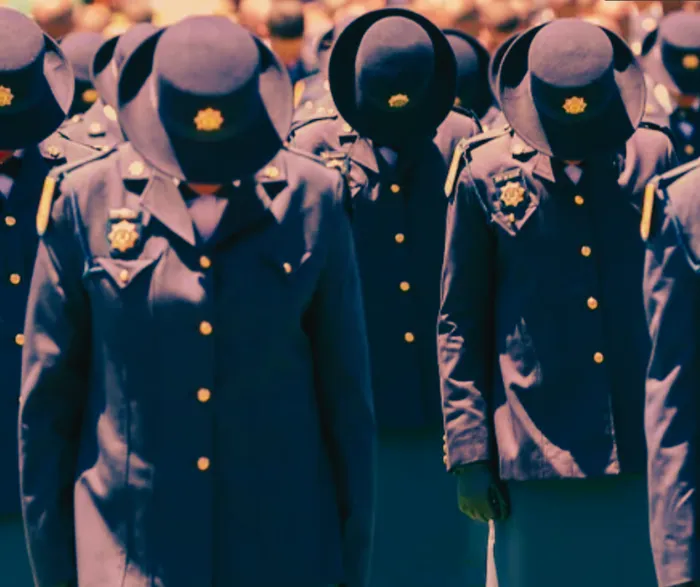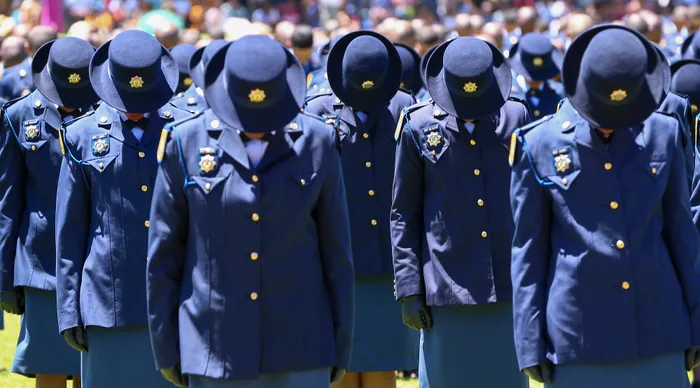Who watches the watchers? Can South Africa clean up Its police?

South Africa’s police service is facing a serious crisis. Corruption, political interference, and operational failures have severely weakened an institution meant to protect citizens.This has led to a loss of public trust and raised important questions about accountability.
Image: Independent Media
South Africa’s police service is facing a serious crisis. Corruption, political interference, and operational failures have severely weakened an institution meant to protect citizens.
This has led to a loss of public trust and raised important questions about accountability.
The Madlanga Commission of Inquiry is shining a light on these failures. On July 6, KwaZulu-Natal Police Commissioner Lieutenant-General Nhlanhla Mkhwanazi alleged criminal infiltration, political meddling, and internal sabotage within SAPS during a press conference.
Meanwhile, the Independent Police Investigative Directorate (IPID), tasked with holding police accountable, struggles with backlogs, limited staff, and budget cuts, raising urgent questions about whether oversight mechanisms are strong enough to prevent abuse.
Led by Justice Mbuyiseli Madlanga, the commission, alongside Parliament’s Ad Hoc Committee on Police Oversight, was established to investigate allegations of criminal infiltration, political manipulation, and internal sabotage within SAPS.
Witness testimony so far paints a bleak picture of a policing system hollowed out by corruption and weakened by poor oversight.
Depoliticising and reforming the police
Chanel van Linder, senior researcher at the Helen Suzman Foundation (HSF), said that clearer constitutional reforms are necessary.
“The Madlanga Commission has once again highlighted the need for a clearer division between the policy and oversight role of the Minister of Police and the operational and management responsibilities of the National Commissioner and other senior officials,” she said.
Van Linder noted that a constitutional reform process should explicitly define this separation to prevent political interference in operational matters.
Van Linder said this separation should be constitutionally defined, echoing one of the long-standing recommendations of the Marikana Commission, which urged that senior appointments in SAPS be depoliticised and reserved for individuals with professional expertise.
That commission, established in 2012 after the Marikana massacre, also called for strong and consistent leadership “which sets transparency and accountability as key objectives of the SAPS.”
She also emphasised the importance of the IPID in holding police accountable.
“IPID must be granted full structural and operational independence to perform its mandate without fear, favour, or prejudice,” Van Linder said. Strengthening IPID, she argued, is essential to maintain public confidence in police oversight.
Van Linder also warned about the need for civil society to maintain pressure. Drawing lessons from the Zondo Commission, she said civil society should “continue to monitor and publicly track progress on the Madlanga Commission’s recommendations to ensure transparency and accountability.''
She added that, while public oversight is vital, “a truly democratic government should not solely rely on external oversight to uphold accountability. Government itself must take proactive and transparent steps to implement the Commission’s recommendations in good faith.”
The Marikana Commission’s policing experts similarly recommended the creation of an Independent Oversight Body to monitor the implementation of inquiry findings and ensure SAPS accountability.
They proposed a full audit trail for police operations, decision-making logs for senior commanders, and stronger forensic tracking of police firearms to prevent abuse and manipulation.
Oversight Without Powers
Corruption Watch senior writer Moepeng Talane said the evidence emerging from the Madlanga hearings “concerns us all.”
''South Africans should be able to trust that those in leadership positions in the criminal justice system uphold the rule of law,” he said. He warned that executive interference, such as allegations against Police Minister Senzo Mchunu, could further erode public trust.
He also stressed the inadequacy of whistleblower protections. “We unfortunately do not have a fail-safe system for the protection of whistle-blowers in South Africa that guarantees absolute safety. A strong whistle-blower protection arrangement is imperative if the country is to reduce its high levels of corruption,” Talane said.
Civil society organisations argue that public involvement must extend beyond simply watching the proceedings. While the Madlanga Commission has made its work accessible through live-streaming and public submissions, they stressed that transparency must be followed by action.
“We are pleased that the commission is as accessible as it is currently, with live streaming services that allow all South Africans to follow its proceedings,” said Talane.
“But beyond hearing the evidence, South Africans must demand that its terms of reference are adhered to and respected, and that happens by supporting civil society efforts that insist on accountability.”
Talane urged civil society to take an active watchdog role during the commission’s work. “President Cyril Ramaphosa committed the commission to certain terms, such as an interim report within a clear timeframe. That should be the standard on which we hold it accountable,” he said.
Talane resonated with Letlhogonolo Letshele of Open Secrets, who recently warned that the failures to implement the Zondo Commission’s recommendations risk repeating the same cycle of state capture and impunity. “We simply cannot afford another nine wasted years,” Letshele said in a statement.
A Failing Justice System
The figures paint a grim picture. BOSA spokesperson Roger Solomons said the Madlanga Commission highlights the failure of the criminal justice system.
“Only 167,000 inmates are currently behind bars, representing just 0.2% of the population,” he said, citing a parliamentary reply by Correctional Services Minister Pieter Groenewald.
“When weighed against more than 1.3 million serious crimes reported annually, this figure exposes the breakdown between crime committed, cases investigated, and justice delivered,” Solomons said.
He pointed to SAPS’s shortage of over 2,000 detectives as a core reason for poor investigation outcomes.
“It’s a vicious cycle ,fewer detectives mean fewer solved cases, and that emboldens criminals,” he said.
Organised Crime and Corruption
Specialist Investigator Mike Bolhuis, described a system thoroughly infiltrated by organized crime and corruption. He warned that the public should not be surprised by revelations coming from the Madlanga Commission.
“There is so much media exposure, which is truthful. It is totally sensational. Our country is completely and totally run by organised criminals and racketeers. This involves government officials, high-ranking police officers, gangs, and extreme businessmen,” he said.
Bolhuis also singled out specific instances of corruption. Speaking about the controversial business figure Vusimuzi 'Cat' Matlala, who secured contracts with SAPS despite being implicated in criminal activity, he said, “They knew all along. And he’s not the only one. This has been going on for a long time.”
He emphasised the systemic nature of corruption within SAPS. “All these generals and top officials have files on each other. There are people that have files on the president. That’s how organised crime and racketeering operate: if you talk, I talk. They stand as a monster, fully grown and fully organised,” Bolhuis said.
The expert called for decisive action. “The solution is real investigations by independent people that cannot be influenced or corrupted. Real policemen, fully and totally qualified, must be put in place, and those found guilty must be really punished. Everything must be done in the eye of the public,'' Bolhuis said.
He added that salaries should be scrutinized monthly to prevent unexplained wealth, and top appointments should be based on qualifications, integrity, and ability to curb crime.
IPID’s Resource Crisis
Meanwhile,IPID executive director Dikeledi Ntlatseng told Parliament that a R30-million budget cut and limited staffing have undermined the watchdog’s ability to perform. “With 69% of our budget going to salaries and 176 investigators covering the whole country, the workload is strenuous,” she said.
Ntlatseng highlighted the backlog of cases, particularly in KwaZulu-Natal, Gauteng, Eastern Cape, and Western Cape. “We carried over 11,000 backlog cases at the start of the financial year,” she said. She added that strategic interventions include forming new research and forensic units, upgrading case management systems, and training investigators in collaboration with specialised agencies.
She also outlined reforms aimed at improving accountability and transparency. “We are establishing an investigation unit to deal with corruption and bringing in contract workers, including retired detectives, to reduce the backlog. The Special Investigating Unit (SIU) and additional entities have been requested to train our investigators to improve quality of investigations,” Ntlatseng said.
Lessons from Marikana and Zondo
The Marikana Commission, which investigated the 2012 killing of 34 miners by police, recommended demilitarising SAPS, creating an independent oversight body, and monitoring police use of force. It also called for stronger accountability mechanisms within IPID.
“The demilitarisation of the police must be undertaken as a top priority,” the commission found, urging a review of SAPS’s “organisational culture and subculture.”
Similarly, the Zondo Commission confirmed that state capture “did indeed take place” during the Zuma era and exposed widespread corruption in policing and procurement. Yet, despite its six-volume report and R1-billion cost, implementation has lagged. Civil society notes that Parliament has failed to pass reforms or hold implicated officials accountable.
“The ongoing failure to act on the Zondo findings weakens public faith in the justice system,” organisations warned. “The Madlanga Commission must not end the same way, with good reports gathering dust.”
Accountability Must Follow
According to experts, commissions of inquiry such as Madlanga are vital for accountability but are limited in enforcement powers. Corruption Watch explained that commissions cannot prosecute; they can only investigate, make findings, and recommend actions
Legal expert Lauren Kohn explained that commissions like Madlanga’s are “fact-finding, truth-seeking, and public-confidence-restoring mechanisms.” They can investigate and recommend, but cannot prosecute, she said.
Despite criticisms of being slow and costly, experts agree these inquiries remain vital. They expose corruption networks, empower reform, and provide a roadmap for rebuilding institutions.
Sabeehah Motala, a senior advisor with GIZ South Africa, summed it up: “A commission’s value lies not just in the facts it uncovers, but in what we do with them.”
Despite criticisms of past commissions, including the Seriti and Marikana inquiries, experts argue that they remain valuable tools to restore public trust, provided that recommendations are implemented and those responsible are held accountable.
hope.ntanzi@iol.co.za
IOL News

The South African Police Service will be hosting passing out parades for newly trained police officers on Friday.
Image: Leon Lestrade / Independent Newspapers